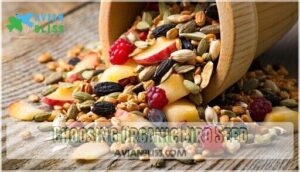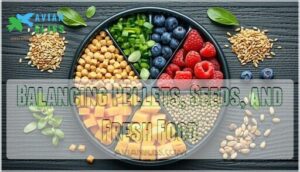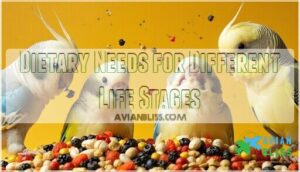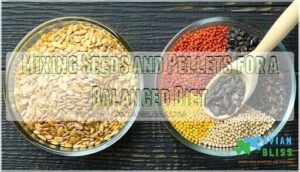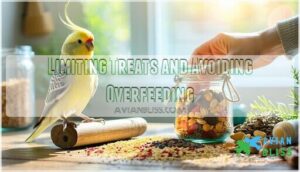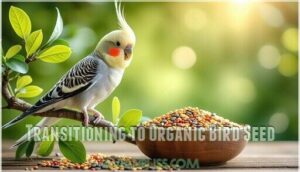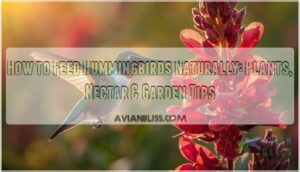This site is supported by our readers. We may earn a commission, at no cost to you, if you purchase through links.
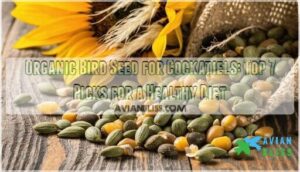
Look for USDA-certified options without pesticides or artificial additives. Your cockatiel needs a balanced diet—about 30% should be quality seeds like millet, safflower, and sunflower.
Mix these with organic pellets, fresh vegetables, and occasional fruits for ideal nutrition. Like picky toddlers, cockatiels can be stubborn about new foods, so introduce organic options gradually.
Store seeds in cool, dry places to prevent mold growth that could harm your bird. The right organic blend can add years to your cockatiel’s life and put an extra bounce in those happy morning chirps.
Table Of Contents
- Key Takeaways
- Choosing Organic Bird Seed
- Nutrition Requirements for Cockatiels
- Top 7 Organic Bird Seeds for Cockatiels
- Creating a Healthy Diet With Organic Bird Seed
- Transitioning to Organic Bird Seed
- Frequently Asked Questions (FAQs)
- What are the healthiest seeds for cockatiels?
- What is the healthiest cockatiel food?
- How to make homemade cockatiel food?
- What is the best natural bird seed?
- Which bird seed is best for cockatiel?
- How do I Choose birdseed for my cockatiel?
- Can cockatiels eat seeds?
- Which pellets are best for cockatiels?
- What is the best cockatiel food?
- What is cockatiel blend?
- Conclusion
Key Takeaways
- You’ll support your cockatiel’s health by feeding them a balanced diet of 40% pellets, 30% organic seeds, and 30% fresh fruits and vegetables, avoiding harmful pesticides and additives found in conventional bird seed.
- When choosing organic bird seed, look for USDA-certified options that contain nutritious varieties like millet, safflower, and canary grass seed, which provide essential nutrients for your feathered friend’s overall well-being.
- You can transition your cockatiel to organic bird seed by using a gradual approach—start with a 10% weekly increase mixed with their current food, and monitor their droppings and energy levels during the switch.
- Top organic options include Harrison’s Organic Bird Food, ZuPreem Natural Pellets, and Sun Dried Millet Bird Treat, which you’ll find help promote vibrant feathers, increased energy, and fewer potential health issues in your cockatiel.
Choosing Organic Bird Seed
When you choose organic bird seed, you’re giving your cockatiel a cleaner, healthier diet free from harmful pesticides and additives.
It’s like upgrading their meals to gourmet status while supporting their health and the environment!
Benefits of Organic Bird Seed
Choosing organic bird seed is like giving your cockatiel a healthy, gourmet meal every day!
Packed with nutrient density and non-GMO ingredients, organic bird food guarantees your feathered friend skips harmful chemicals like pesticides.
Plus, the flavor enhancement from naturally sourced seeds turns mealtime into an adventure.
By opting for sustainable sourcing, you’re not just helping your bird thrive but also protecting the planet.
You can find organic options available online.
Sure, organic cockatiel seed costs more, but its benefits for health and a pesticide-free environment are priceless!
Understanding USDA Organic Certified Bird Seed
Think about organic bird seed as a wholesome feast for your cockatiel, thanks to USDA Organic Certification.
It’s packed with benefits:
- Non-GMO assurance: Only natural ingredients, no genetic meddling.
- Additive-free guarantee: No hidden chemicals means purer meals.
- Ethical sourcing impact: Good for the environment, better for your bird.
With organic cockatiel seed, your feathered pal gets safer, pesticide-free bird seed that prioritizes health and happiness.
A cleaner diet helps support their gut health.
Nutrition Requirements for Cockatiels
Cockatiels need a mix of seeds, pellets, and fresh foods to stay happy and healthy, just like we need our daily servings of veggies (even if we’d rather skip them).
Knowing what’s safe and what’s not is key, so your feathered friend avoids harmful snacks like avocado or chocolate.
Balancing Pellets, Seeds, and Fresh Food
A cockatiel’s diet is like a colorful buffet—keep it fun and balanced! Use ideal ratios: 40% pellets, 30% organic bird seed, 20% fresh vegetables, and 10% fruits and treats.
Try homemade mixes for variety, ensuring food acceptance. Organic options avoid harmful pesticides.
Portion control prevents overfeeding, while regular vet checkups keep your bird thriving. A balanced diet means happy chirps!
Safe and Unsafe Foods for Cockatiels
Not all foods are friendly to cockatiels, and a few are downright dangerous! Avocados and chocolate top the toxic food list—steer clear of those.
Focus on offering safe veggies like broccoli, carrots, or pumpkin, which pack nutrients without extra sugar. Safe fruits, like apples, are a hit—just ditch those pesky seeds first!
Protein sources, like boiled eggs, are great in small amounts. Fresh, clean water is equally essential. Remember, cockatiel food dangers are real, so stick to nutritious, bird-safe options.
A little planning keeps your feathered buddy chirpy and healthy. You can also find a variety of cockatiel-approved snacks online.
- Toxic foods to avoid: Avocados, chocolate, apple seeds, onions, and rhubarb
- Safe fruits: Apples (seedless), blueberries, strawberries, bananas
- Safe veggies: Carrots, sweet potatoes, kale, zucchini
- Treat tip: Limit processed snacks to avoid sugar overload
- Surprise them: Small bites of cooked eggs or millet make healthy treats!
Dietary Needs for Different Life Stages
Every stage of life calls for special care.
Baby bird diets focus on protein-packed meals for growth.
Adult cockatiel needs? Balanced seeds, veggies, and pellets.
During breeding season, give extra protein, while molting season needs energy-rich bird food.
Senior bird nutrition leans in the direction of softer seeds.
Organic bird seed keeps them healthy and happy, no matter their age.
Top 7 Organic Bird Seeds for Cockatiels
Choosing the right organic bird seed for your cockatiel can feel like figuring out their favorite tune—it’s all about balance and quality.
We’ve rounded up seven top picks that are packed with nutrients and free of harmful additives, so your feathered friend can sing away in good health!
1. Sun Dried Millet Bird Treat
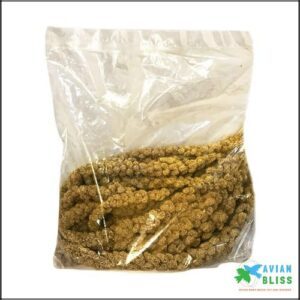
If your bird could talk, it might say, "More of this, please!"
The Sun Dried Millet Bird Treat from Nemeth Farms isn’t just another snack—it’s a healthy, natural delight packed with carbohydrates, protein, and amino acids.
These nutrients do wonders for your cockatiel’s muscles, feathers, and overall health.
US-grown without pesticides or GMOs, this millet is as clean as it gets.
Sun-dried to lock in flavor, every bite is pure goodness.
Sure, it’s a bit pricier than average, but happy pet parents swear by its unbeatable freshness and quality.
Treat your feathered friend—because if they could, they’d definitely swipe right for this snack!
Best For: Bird owners looking for premium, natural, and nutritious millet treats for a wide range of pet birds and small mammals.
- Rich in carbohydrates, protein, and amino acids for overall bird health.
- GMO-free, pesticide-free, and sun-dried for maximum freshness and safety.
- Highly favored by birds, supporting trust and affection between pet and owner.
- Higher price compared to some alternative millet products.
- Only available in specific sizes, limiting bulk-buying options.
- Not the cheapest option for budget-conscious pet owners.
2. Harrison’s Organic Bird Food Adult
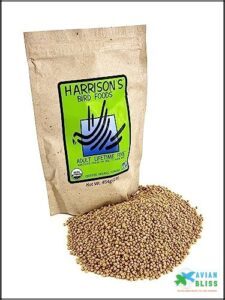
Harrison’s Organic Bird Food Adult is like a five-star meal for your cockatiel, offering certified organic, non-GMO ingredients packed with essential nutrients.
With Omega-3 and 6 fatty acids, it promotes vibrant feathers and a happy, energetic bird.
Switching from seeds to these pellets might feel like asking someone to swap pizza for salad, but your cockatiel’s health will thank you.
Keep the pellets fresh by sealing the package tightly, and consider hand-feeding a few pieces to ease the change.
Birds often develop healthier habits within weeks, leaving you with a chirpy companion that’s thriving on this well-rounded, vet-approved diet that includes essential nutrients!
Best For: Non-breeding, non-molting small to medium birds like cockatiels, lories, and quakers requiring a certified organic, vet-recommended diet.
- Pellet size may not suit smaller birds like parakeets.
- Requires proper storage to maintain freshness.
- Higher cost compared to standard seed-based diets.
- Promotes vibrant feathers and overall health with Omega-3 and 6 fatty acids.
- Certified organic, non-GMO ingredients for high-quality nutrition.
- Easily transitions birds from seed-based diets in a short time.
3. ZuPreem FruitBlend Bird Food Pellets
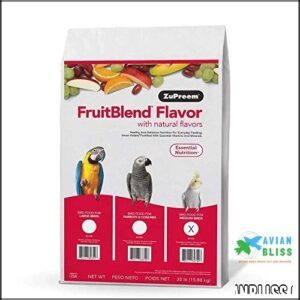
ZuPreem FruitBlend Bird Food Pellets bring a splash of color and nutrition to your cockatiel’s plate.
Packed with fruity flavors like grapes, bananas, oranges, and apples, they’re a feast for the senses, even for fussy eaters.
Each pellet is fortified with 21 essential vitamins and minerals, supporting your feathered friend’s overall health.
The variety of shapes and colors might even spark some playful curiosity.
Bulk packaging saves money, but don’t be surprised if your bird shows a cheeky preference for certain colors!
Best For: Medium parrots like Cockatiels, Quakers, and Lovebirds that need balanced and nutritionally complete food.
- Fortified with 21 essential vitamins and minerals.
- Fruity flavors and colorful pellets attract fussy eaters.
- Cost-effective bulk packaging with a long shelf life.
- Some birds may take time to transition from seeds to pellets.
- Birds might prefer certain pellet colors and leave others uneaten.
- Not all bird species readily accept the pellets.
4. Kaytee Cockatiel Bird Food 2.5 Pound
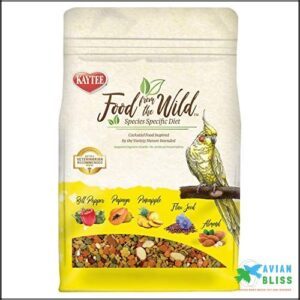
Does your cockatiel turn up its beak at mealtime? Kaytee Cockatiel Bird Food, a 2.5-pound mix, might be the answer to your feathered friend’s finicky habits.
Designed to mimic their natural diet, it combines the goodness of papayas, pineapples, flax seeds, almonds, and more into a nutritious feast birds love.
This food is packed with Omega-3s for brain and heart health, along with prebiotics and probiotics to support digestion. Plus, it’s free of artificial fillers or preservatives, so you can feel good about what your bird’s eating.
While some buyers report it being a little dry, many rave about its quality and the way it keeps their cockatiels interested. If your bird’s a picky eater, this mix just might smooth out mealtime woes!
A varied diet guarantees balanced nutrient intake for peak health.
Best For: Cockatiel owners looking for a nutritious, natural diet that supports their bird’s health and mimics their wild feeding habits.
- Packed with Omega-3s, prebiotics, and probiotics for overall health.
- Wide variety of natural ingredients to mimic wild foraging.
- Free from artificial fillers or preservatives.
- Some buyers report concerns about dryness and freshness.
- Mixed reviews on colorful ingredient inclusions in recent batches.
- Not all picky eaters may respond positively.
5. Roudybush Daily Maintenance Bird Food Crumbles
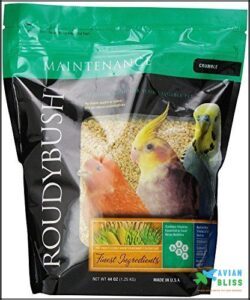
Packed with essential nutrients, Roudybush Daily Maintenance Bird Food Crumbles makes feeding your cockatiel a breeze.
I’ll create a short, engaging blockquote in the same tone as the content:
Roudybush Crumbles deliver essential nutrients in every bite—like a gourmet health meal your cockatiel can’t resist!
With 11% protein and 7% fat, it’s designed to keep your bird active, healthy, and thriving. Steam-pelleted for maximum nutrient retention and to nix harmful bacteria, these crumbles fit right into a balanced diet.
Got a picky eater? No worries—many birds can’t resist this option! It’s perfect for year-round feeding, whether during the quiet months or breeding season.
If your bird sticks to seeds, try a gradual switch by offering these crumbles after a short seed break—they’ll adjust in no time. Healthy eating has never been easier—or tastier—for your feathered friend!
Best For: Birds 3 inches and taller, including cockatiels, quakers, lovebirds, and other species transitioning to a healthier, balanced diet.
- Scientifically formulated with balanced nutrients for overall health.
- Loved by picky eaters, with an appealing taste and texture.
- 100% edible, ensuring no waste and easy cleanup.
- Slightly expensive compared to alternatives.
- Availability may be limited in some regions.
- Requires a gradual transition for seed-only fed birds.
6. ZuPreem Natural Bird Food Pellets
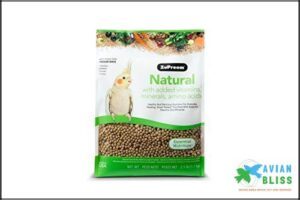
Looking for a natural option in your cockatiel’s diet? ZuPreem Natural Bird Food Pellets offer an excellent choice made with 100% natural ingredients.
These pellets are specially formulated for medium birds like cockatiels, quakers, and lovebirds, providing complete nutrition without added dyes or sugar. What sets these pellets apart is their careful balance of added vitamins, minerals, and amino acids that support your feathered friend’s long and active life.
The natural formulation helps birds switch from seed-heavy diets to more nutritious options. Many owners report their cockatiels show increased feather brightness after switching to ZuPreem.
While some birds might need time to adjust (they can be picky eaters!), the health benefits are worth the patience. Remember, like finding the perfect coffee blend, discovering your bird’s preferred food takes some experimentation!
Best For: Medium birds like cockatiels, quakers, lovebirds, and small conures seeking a natural, pellet-based diet for balanced nutrition.
- Made with 100% natural ingredients without added dyes or sugar.
- Supports healthier diets by helping birds transition from seed-based food.
- Enhances feather brightness and overall bird health.
- May not suit birds with specific dietary restrictions due to corn content.
- Some birds might take time to adjust to the pellets.
- Considered pricey compared to other options by some users.
7. Organic Parrot Food Sample Pack
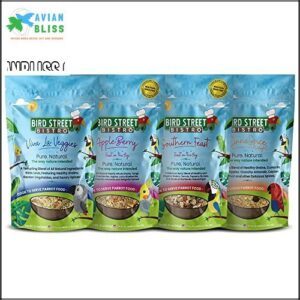
Treat your feathered friend to a flavor adventure with the Organic Parrot Food Sample Pack.
This USDA Certified organic buffet comes in four delicious varieties: Viva La Veggies, Apple Berry, Southern Feast, and Cinna Spice Delight.
You’ll love that it’s 100% natural with no fillers, sugars, or artificial ingredients.
Instead, it’s packed with freeze-dried fruits, whole grains, and healthy spices like cayenne for blood cleansing and kelp for beautiful feathers.
Ready in just 3-15 minutes, this USA-made mix works for most cockatiels, though some picky eaters might need convincing.
Maybe start with a smaller pack to test your bird’s preferences!
Best For: Parrot owners seeking a USDA Organic Certified, natural, and nutritious food option to support their bird’s health and well-being.
- Made with 100% organic ingredients and no artificial additives.
- Easy to prepare in 3-15 minutes with multiple flavor options.
- Supports feather conditioning and overall bird vitality.
- Some birds may not enjoy the cooked version, leading to potential waste.
- Higher price point compared to non-organic bird food options.
- Mixed preferences among different bird species.
Creating a Healthy Diet With Organic Bird Seed
You’ll transform your cockatiel’s health by creating a balanced diet with 40% pellets, 30% organic seeds, and 30% fresh fruits and vegetables.
Just like how we wouldn’t want to eat fast food every day, your feathered friend needs variety to thrive – mixing those organic seeds with colorful bell peppers and apple slices will have your bird singing with joy and liveliness.
Mixing Seeds and Pellets for a Balanced Diet
Through careful planning, you can create the perfect seed-pellet balance for your cockatiel’s best health.
- Start with a 30% seed to 40% pellet ratio for nutritional balance
- Introduce different pellet varieties to discover your bird’s preferences
- Create customized homemade mixes with organic seed varieties
- Implement gradual introduction techniques, starting with a 50/50 blend before adjusting
Remember proper portion control—cockatiels only need about two tablespoons of food daily!
Many owners choose USDA organic certification to guarantee quality.
Adding Fresh Fruits and Vegetables
To round out your cockatiel’s diet, fresh fruits and vegetables provide essential vitamins that seeds alone can’t deliver.
Your feathered friend will chirp with delight when offered colorful produce alongside their organic bird seed.
| Safe Produce | Vitamin Boost | Portion Size |
|---|---|---|
| Bell peppers | Vitamin C | 1 teaspoon |
| Kale | Vitamin A | 1 small leaf |
| Apple (no seeds) | Fiber | ½ teaspoon |
| Carrots | Beta-carotene | 1 teaspoon |
Consider offering safe vegetables for ideal health, and remember that dietary variety keeps mealtime exciting, which can be found at offering safe vegetables.
Limiting Treats and Avoiding Overfeeding
While fresh vegetables and fruits nourish your cockatiel, treats require careful management. Your feathered friend can easily pack on unhealthy weight when treats become routine.
To maintain balanced cockatiel nutrition:
- Limit treats to 10% of their daily diet
- Choose healthy cockatiel treats like small pieces of organic millet
- Create foraging enrichment opportunities instead of offering unlimited snacks
Remember: portion control prevents obesity while still allowing your bird enjoyable variety in their cockatiel diet plan, ensuring a healthy lifestyle.
Transitioning to Organic Bird Seed
You’ll need to switch your feathered friend to organic seed gradually, mixing small amounts with their current food until they’re ready for the full swap.
Just like how we might resist trading our favorite chips for kale chips, your cockatiel may need time to embrace these healthier, pesticide-free alternatives that will ultimately support their vibrant plumage and overall wellness.
Tips for Converting to Organic Seed
Now that you’ve set the foundation for a healthy diet, let’s explore practical methods for switching to organic seed.
Converting your cockatiel to organic bird seed works best with a gradual approach. Start by introducing small amounts mixed with their current food.
| Strategy | Timeline | Success Rate |
|---|---|---|
| 10% weekly increase | 5-8 weeks | High |
| Mirror method | 3-4 weeks | Medium |
| Softened with fruit juice | 1-2 weeks | Variable |
Monitor your bird’s droppings and energy levels during the switch. Remember, each cockatiel has unique taste preferences—consult your vet if you notice any health changes.
Gradually Introducing New Foods
Patience transforms food phases into successful dining adventures for your cockatiel.
Introduce organic seed mixes gradually by blending small amounts with familiar food, increasing portions weekly as acceptance grows.
- Mix new seeds with favorite treats to encourage exploration
- Offer variety in textures—some birds prefer crunchy while others like softer foods
- Place fresh fruits and vegetables near familiar feeding spots
- Watch for positive behavioral changes during dietary shift
- Keep portion sizes consistent to build trust with picky eaters
The key to a successful transition is to make it a gradual process and to monitor the bird’s behavior, looking for signs of positive behavioral changes.
Monitoring Health and Adjusting The Diet
Now that you’ve started introducing new foods, keep a watchful eye on your feathered friend’s health signals. Regular monitoring helps you fine-tune their organic seed diet for peak wellness.
| Health Indicator | What to Watch For |
|---|---|
| Dropping Analysis | Color, consistency, frequency |
| Energy Levels | Playfulness, alertness, singing |
| Feather Condition | Shine, smoothness, molting patterns |
| Weight Changes | Gain or loss beyond normal range |
Observe behavior daily and conduct weekly health checks. If you notice dull feathers or unusual droppings, adjust quantities accordingly. It’s like reading your bird’s personal nutrition diary!
Remember to weigh your bird monthly and schedule regular vet checkups for professional assessment.
Frequently Asked Questions (FAQs)
What are the healthiest seeds for cockatiels?
The healthiest seeds for your cockatiel include safflower, canary grass seed, millet, and flax seeds.
You’ll want to offer these as part of a balanced diet alongside pellets, vegetables, and limited fruits.
What is the healthiest cockatiel food?
A balanced cockatiel diet should include 40% high-quality pellets, 30% organic seeds, and 30% fresh fruits and vegetables. You’ll want to avoid sunflower seed-heavy mixes that can lead to nutritional deficiencies.
How to make homemade cockatiel food?
Mix seeds like millet and safflower with finely chopped vegetables, fruits, and cooked quinoa.
You’ll create nutritious homemade cockatiel food that’s cheaper than store-bought options.
Just avoid toxic ingredients like avocado and chocolate.
What is the best natural bird seed?
Harrison’s Organic Bird Food stands out as your best bet.
You’ll love its USDA-certified ingredients that’ll keep your feathered friend healthy and happy.
It’s worth every penny for those vibrant feathers!
Which bird seed is best for cockatiel?
A staggering 70% of cockatiels thrive on balanced seed mixes.
You’ll want a high-quality mix with safflower, millet, and canary seed.
Harrison’s Organic or Kaytee Supreme are excellent choices for your feathered friend.
How do I Choose birdseed for my cockatiel?
Choose a mix with 30% quality seeds and 40% pellets for your cockatiel.
Look for USDA Organic options without artificial additives.
You’ll want to introduce new foods gradually—your feathered friend will thank you!
Can cockatiels eat seeds?
Yes, seeds form 30% of a cockatiel’s ideal diet.
You’ll want to incorporate them alongside pellets (40%), vegetables (20%), and fruits (10%) for a balanced nutrition plan that keeps your feathered friend happy and healthy.
Which pellets are best for cockatiels?
For your feathered friend, Harrison’s Organic Bird Food and ZuPreem FruitBlend stand out as top choices.
They’re packed with essential nutrients, have excellent reviews, and you’ll notice healthier feathers in no time!
What is the best cockatiel food?
Your cockatiel will thrive on a balanced diet of 40% quality pellets like Harrison’s, 30% seeds, 20% veggies, and 10% fruits.
Mix it up to keep your feathered friend’s meals as exciting as their personality!
What is cockatiel blend?
Did you know 70% of bird owners use specialized blends for their pets?
Your cockatiel blend is a customized seed mix with various grains, nuts, and fruits designed specifically for your feathered friend’s nutritional needs.
Conclusion
Choosing organic bird seed for cockatiels isn’t just a trend—it’s a commitment to your feathered friend’s health.
You’ll notice brighter feathers, increased energy, and potentially fewer vet visits when you make the switch.
Remember, quality nutrition today means more happy chirps tomorrow!
By incorporating these top organic options into a balanced diet, you’re giving your cockatiel the foundation for a vibrant, healthy life.
Your bird can’t thank you with words, but those playful head bobs speak volumes!

